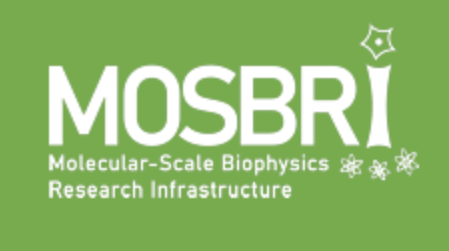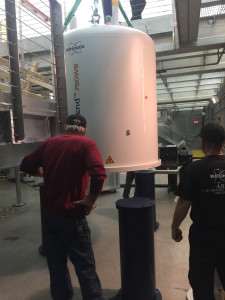funding
MOSBRI Biophysics Infrastructure
Starting later this year, the RUG ssNMR group will be of the newly funded MOlecular-Scale Biophysics Research Infrastructure (MOSBRI) network. This EU-wide consortium enables ambitious integrative multi-technological studies of biological systems at the crucial intermediate level between atomic-resolution structural descriptions and cellular-scale observations. MOSBRI provides European academic and industrial researchers with a one-stop shop Trans-National Access to the latest technological developments in advanced spectroscopies, hydrodynamics, thermodynamics, real-time kinetics and single molecule approaches.
More information can be found on the MOSBRI website, and also on our own MOSBRI page.
This infrastructure network is supported by EU funding and features resources in many EU countries (and the UK). The page of the University of Groningen hub is found here.

Competitive PhD Scholarships call open (deadline April 1st)
Our Institute and Faculty have opened up a competitive call for PhD scholarship applications. Our solid-state NMR group participates in one of the research theme areas, designated as “Advanced Materials”, which spans topics from physics of life, via bio-inspired materials, to materials and much more. The process is described in some detail on the RuG website. Briefly, applicants (with a MSc degree) are expected to contact a PI/supervisor (immediately!) and develop a fitting project to submit. The submission deadline of an initial idea (few hundred words) is due by April 1st 2020!
Suitable ideas are expected to fit within designated topics areas, described on the website here and here. Note especially also the 2nd link, as it contains important detailed information.T
Interested in this? Please contact us as soon as possible, to meet the tight deadlines. Together we can consider topics that range from self-assembling bio-inspired materials, Physics of Cancer, non-biological materials and other topics. Projects will be highly interdisciplinary as the involvement of a second supervisor is also required, with a distinct and complementary expertise.
New PhD position available – polyglutamine structural biology.
Update: this position has been filled!
26/02/2019: A new fully-funded PhD position in the lab is available in our project studying the structure of polyglutamine amyloid proteins involved in Huntington’s disease. This research position will focus to a large extent on continuing and expanding the structural ssNMR methods that we previously reported in:
• Hoop et al. Huntingtin exon 1 fibrils feature an interdigitated β-hairpin-based polyglutamine core. Proc. Natl. Acad. Sci. USA. 2016 Feb 9;113(6):1546–51.
This will involve the development, testing and application of advanced ssNMR structural measurements. Aside from the ssNMR development work, structural measurements will be integrated with mechanistic and biological assays, similar to prior our paper:
• Lin et al. Fibril polymorphism affects immobilized non-amyloid flanking domains of huntingtin exon1 rather than its polyglutamine core. Nat Commun. 2017 May 24;8:15462.
The applicant is also expected to be comfortable with the English language and enthusiastic about working in a collaborative team environment. The ideal candidate would have a relevant MSc degree in physics or chemistry, experience with NMR spectroscopy, and a genuine interest in (bio)physics and protein structural biology. Interested individuals with a different, but relevant, background are encouraged to inquire. Inquiries, questions, and applications should be sent by email to p.c.a.van.der.wel@rug.nl. Applications should include a CV, a cover letter describing your motivation for being interested in the project and contact information for two or three reference writers.
Also posted here.
12/03/2019 – update – the funding organisation (Campagneteam Huntington) has posted a news item about their support of this research project.
Looking for NMR research technician (MSc/PhD)
More information to follow later, but we just posted the official advertisement for a new research technician with a NMR/SSNMR background. For details see here:
https://www.rug.nl/about-us/work-with-us/job-opportunities/overview?details=00347-02S0006SAP
The deadline is Feb 14th, 2019. Applications should be done via the above URL.
NIH funding for mitochondrial apoptosis research.
The National Institutes of Health (NIH) have awarded the Van der Wel group a new R01 grant to support our research into the molecular mechanisms of mitochondrial apoptosis. Mitochondrial apoptosis is a vital cellular process required for proper development and health. However, malfunctioning of this process, e.g. undesired up- or down-regulation, plays a key role in diseases ranging from cancer to neurodegeneration, including Huntington’s Disease. In this project we investigate pivotal processes that occur early on in the apoptotic pathway, and thus may present important targets for medical intervention. A key focal point is on the role of mitochondrial membranes, and in particular the impact of changes in their structure, fluidity, and integrity. Our studies will leverage state-of-the-art ssNMR experiments, functional assays, and an array of biochemical and biophysical techniques.
Related Publications
- Structural changes and pro-apoptotic peroxidase activity of cardiolipin-bound mitochondrial cytochrome c. Mandal, A., Hoop, C.L., DeLucia, M., Kodali, R., Kagan, V., Ahn, J., Van der Wel, P.C.A.* (2015) Biophys. J. 109(9): 1873–1884 (DOI)
- Lipid Dynamics and Protein-Lipid Interactions in Integral Membrane Proteins: Insights from Solid-State NMR. Van der Wel, P.C.A.* (2014) eMagRes. 3: 111–118 (DOI) (PDF download)
New ssNMR spectrometer update

The new NIH-funded 750MHz solid-state NMR instrument has now been delivered to the Department of Structural Biology NMR facility. It is currently being installed and configured.
NEW: Photos of the installation process are available in this online gallery.
This state-of-the-art instrument adds exciting new capabilities for advanced MAS ssNMR to the facility, such as the inclusion of new ‘very-fast’ MAS probes. The spectrometer will facilitate and enhance our ongoing studies of protein misfolding and aggregation in Huntington’s Disease, and studies of the protein-lipid interactions underlying cell death and neurodegeneration.
Biophysical Society meeting news!
Congratulations to Jennifer and Abhishek, for being selected for a talk and awarded travel grants for the coming Biophysical Society Meeting in San Diego! We look forward to seeing you there, and tell you more about our studies of protein deposition diseases and protein-lipid interactions.
Update: see also the press release by the Biophysical Society.
New spectrometer update (revised July ’15).
Our new wide-bore 750MHz solid-state NMR spectrometer (funded by the NIH High-End Instrumentation Award program) is scheduled to be installed during the summer (July 2015) in the fall of 2015. This will bring exciting new solid-state NMR capabilities, including lower temperature operation and ultra-fast MAS, among other things. Stay tuned for further updates!
Polyglutamine research funded by NIH
Starting January 2015, the NIH NIGMS has awarded our R01 proposal on the molecular characterization of the misfolding and aggregation of expanded polyglutamine proteins. Polyglutamine expansion underlies various related diseaseas, including Huntington’s Disease and several other ataxias. The nature of the misfolding mechanism and the structures of the misfolded species remain poorly understood. The R01 will support our ongoing studies using magic-angle-spinning NMR (and other tools) to provide the need structural insights.
MBSB T32 fellowship awarded to Cody!
The Pitt/CMU Molecular Biophysics & Structural Biology graduate program has awarded one of its three T32 fellowships to Cody. Congratulations and great job!
